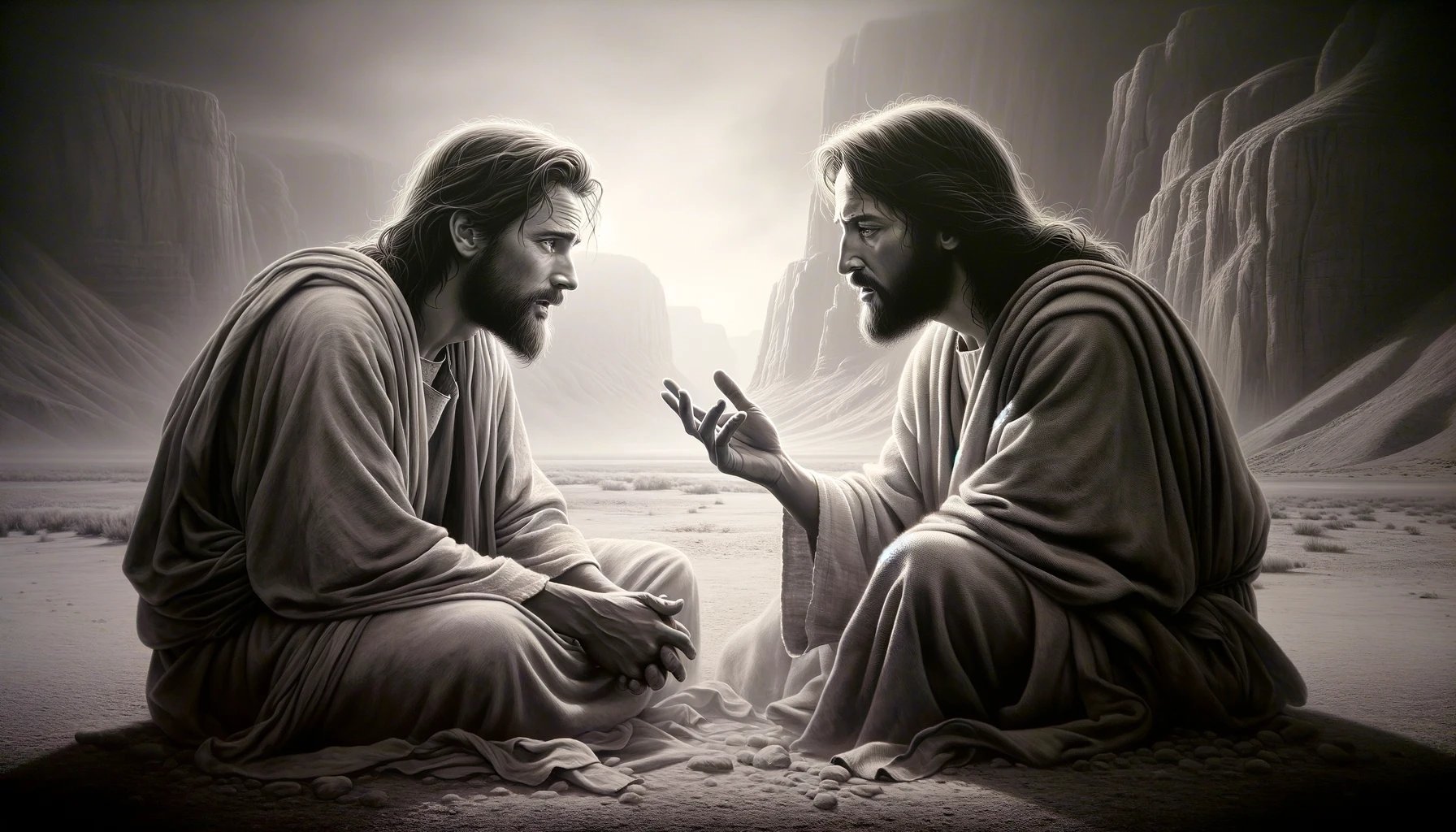Home>Christian Videos>Bible Stories>What Do Vedas Say About Jesus Christ


Bible Stories
What Do Vedas Say About Jesus Christ
Published: March 2, 2024
Jason DeRose, Managing Editor at Christian.net, uses his expertise in religion and journalism to deepen understanding of faith's societal impacts. His editorial leadership, coupled with a strong academic background, enriches the platform’s diverse content, earning him recognition in both journalism and religious circles.
Discover what the Vedas reveal about Jesus Christ and explore the connections between Vedic teachings and Bible stories. Uncover the profound insights and parallels between these ancient scriptures.
(Many of the links in this article redirect to a specific reviewed product. Your purchase of these products through affiliate links helps to generate commission for Christian.net, at no extra cost. Learn more)
Table of Contents
Introduction
What do the Vedas, the ancient scriptures of Hinduism, say about Jesus Christ? This question has intrigued scholars and religious enthusiasts for centuries. The Vedas are revered texts in Hinduism, and their teachings have influenced the spiritual beliefs of millions of people. Exploring the Vedas' perspective on Jesus Christ can provide valuable insights into the intersection of Hinduism and Christianity and shed light on the universal themes that connect these two major world religions. Let's delve into the Vedas' portrayal of Jesus Christ and unravel the spiritual significance attributed to him in the Vedic tradition.
Read more: What Islam Says About Jesus Christ
The Concept of God in the Vedas
The Vedas present a multifaceted understanding of the divine, encompassing various deities and the overarching concept of a supreme, all-encompassing reality. The Vedic texts depict a pantheon of gods and goddesses, each representing different aspects of the divine order. Indra, Agni, Varuna, and many other deities are extolled in the Vedas, signifying the diverse manifestations of the divine in the natural and cosmic realms. However, amidst this rich tapestry of deities, the Vedas also expound on the concept of a supreme, transcendent reality beyond all forms and attributes. This supreme reality is referred to as "Brahman," the ultimate, formless, and eternal essence that pervades the entire cosmos. The Vedas emphasize the worship of this supreme reality while acknowledging the significance of the various deities as manifestations of the divine energy.
Key Points:
- The Vedas depict a pantheon of deities, each representing different aspects of the divine order.
- The concept of "Brahman" signifies the ultimate, formless, and eternal essence that pervades the entire cosmos.
- The worship of the supreme reality is emphasized in the Vedas, alongside the recognition of various deities as manifestations of divine energy.
The Vedic understanding of God as both immanent in the diverse manifestations of the natural world and transcendent as the formless Brahman provides a profound framework for comprehending the divine. This holistic perspective invites individuals to perceive the interconnectedness of all existence while acknowledging the ineffable nature of the supreme reality. The Vedas' portrayal of God as both personal deities and the impersonal Brahman reflects a comprehensive approach to spirituality, accommodating diverse paths of devotion and philosophical inquiry. This inclusive outlook on the divine lays the foundation for exploring the Vedas' perspective on Jesus Christ and his significance within the context of Vedic teachings.
Prophecies and References to Jesus Christ in the Vedas
The Vedas, as ancient scriptures, contain profound verses that have been subject to diverse interpretations and analyses. Some scholars and religious thinkers have sought to identify references or prophecies related to Jesus Christ within the Vedic texts. While the Vedas are not explicit in mentioning Jesus Christ by name, certain verses have been interpreted by some as alluding to his life, teachings, and universal significance.
Key Points:
-
Purusha Sukta: The Purusha Sukta, a hymn found in the Rigveda, describes the cosmic sacrifice of a primordial being, often interpreted as a foreshadowing of Christ's sacrificial mission.
-
Sacrificial Lamb Imagery: The Vedic rituals involving sacrificial offerings, particularly the symbolism of a sacrificial lamb, have been paralleled with the Christian belief in Jesus as the sacrificial lamb who atones for humanity's sins.
-
Universal Savior Figure: Some proponents have drawn parallels between the Vedic concept of an all-encompassing, benevolent savior figure and the role attributed to Jesus Christ in Christianity, emphasizing themes of redemption and universal salvation.
-
Messianic Attributes: Certain attributes and characteristics attributed to the prophesied messiah in the Vedas have been compared with the life and teachings of Jesus Christ, leading to conjectures about potential Vedic foretellings of his advent.
It is important to note that these interpretations are not universally accepted within the Hindu tradition, and the parallels drawn between Vedic verses and the life of Jesus Christ remain a subject of debate and conjecture. The diverse and enigmatic nature of Vedic symbolism and allegory allows for a wide spectrum of interpretations, contributing to the ongoing discourse surrounding the potential references to Jesus Christ within the Vedas.
The quest to discern references to Jesus Christ in the Vedas reflects the profound impact of his teachings and the enduring quest to find common spiritual threads across diverse religious traditions. While the explicit presence of Jesus Christ in the Vedas is a matter of interpretation, the exploration of such potential connections underscores the universal themes of compassion, sacrifice, and divine grace that resonate across different faiths.
Read more: What Does The Quran Say About Jesus Christ
Jesus Christ's Teachings and the Vedic Philosophy
Jesus Christ's teachings, as recorded in the New Testament, encompass profound insights into love, compassion, and the nature of the divine. His emphasis on unconditional love, forgiveness, and the inherent dignity of every individual resonates with the core principles of Vedic philosophy. The Vedic tradition, encapsulated in texts such as the Upanishads and the Bhagavad Gita, expounds on the interconnectedness of all beings, the pursuit of self-realization, and the cultivation of spiritual virtues. Both Jesus Christ and the Vedic sages advocate the transformative power of love and the pursuit of inner harmony as pathways to realizing one's divine nature.
Key Points:
-
Universal Love: Jesus Christ's exhortation to love one's neighbor as oneself and to extend compassion to all beings aligns with the Vedic principle of universal love (Vasudhaiva Kutumbakam), which emphasizes the interconnectedness of humanity and the cultivation of empathy and benevolence.
-
Spiritual Wisdom: The teachings of Jesus Christ and the wisdom imparted in the Vedic scriptures converge in their emphasis on spiritual enlightenment, inner purification, and the realization of the eternal truth. Both traditions underscore the transformative potential of spiritual knowledge in guiding individuals towards liberation and divine communion.
-
Ethical Conduct: Jesus Christ's ethical teachings, including the Sermon on the Mount and the parables illustrating moral virtues, find resonance in the ethical precepts delineated in the Vedic texts. The emphasis on righteousness, integrity, and virtuous conduct as a means to spiritual fulfillment underscores the ethical framework shared by both traditions.
-
Salvation and Liberation: The concept of salvation in Christianity and the pursuit of liberation (moksha) in Vedic philosophy converge in their ultimate goal of transcending worldly limitations and attaining union with the divine. Both Jesus Christ and the Vedic scriptures offer guidance on overcoming suffering and realizing the eternal nature of the self.
The parallels between Jesus Christ's teachings and Vedic philosophy highlight the universal principles that underpin spiritual wisdom and ethical living. The convergence of these profound insights underscores the potential for mutual understanding and harmony among diverse religious traditions, fostering a spirit of unity and shared spiritual aspirations. The exploration of these commonalities invites individuals to recognize the intrinsic unity of all spiritual paths and to embrace the universal values that transcend cultural and religious boundaries.
The Influence of Jesus Christ on Vedic Thought
The profound impact of Jesus Christ's life, teachings, and universal message has reverberated across diverse religious and philosophical traditions, including the rich tapestry of Vedic thought. While the Vedic scriptures predate the advent of Christianity, the spiritual resonance of Jesus Christ's transformative legacy has contributed to the evolving discourse within Vedic thought and the broader Hindu philosophical landscape. The influence of Jesus Christ on Vedic thought manifests in several significant ways, reflecting the enduring interplay of spiritual ideas and the potential for mutual enrichment across religious boundaries.
Key Points:
-
Interfaith Dialogue and Understanding: The emergence of interfaith dialogue and scholarly exchanges has facilitated a nuanced exploration of the parallels between Jesus Christ's teachings and the foundational tenets of Vedic thought. This engagement has engendered a climate of mutual understanding and appreciation, fostering a spirit of shared spiritual inquiry and cross-cultural dialogue.
-
Ethical and Moral Framework: Jesus Christ's ethical teachings, encapsulated in the Sermon on the Mount and his emphasis on compassion, forgiveness, and moral integrity, have resonated with the ethical framework delineated in Vedic scriptures. The universal appeal of ethical virtues and the pursuit of righteousness has contributed to a convergence of ethical principles within Vedic thought, reflecting the enduring influence of Jesus Christ's moral vision.
-
Universal Love and Compassion: The universal message of love, compassion, and the inherent dignity of every individual espoused by Jesus Christ finds resonance with the Vedic principle of universal love (Vasudhaiva Kutumbakam) and the exhortation to extend benevolence to all beings. This shared emphasis on the transformative power of love has enriched the discourse within Vedic thought, fostering a deeper appreciation for the universal values that transcend religious boundaries.
-
Spiritual Unity and Harmony: The inclusive and unifying vision of Jesus Christ's teachings, emphasizing the intrinsic unity of humanity and the interconnectedness of all existence, has contributed to the cultivation of spiritual unity and harmony within Vedic thought. This influence has engendered a spirit of inclusivity and mutual respect, nurturing a shared aspiration for spiritual realization and the pursuit of inner harmony.
-
Cross-Cultural Synthesis: The enduring influence of Jesus Christ's teachings has contributed to a cross-cultural synthesis of spiritual ideas, fostering a climate of mutual enrichment and the assimilation of universal spiritual principles within Vedic thought. This synthesis reflects the dynamic nature of religious and philosophical discourse, acknowledging the potential for diverse traditions to inspire and inform one another.
The influence of Jesus Christ on Vedic thought underscores the dynamic interplay of spiritual ideas and the potential for mutual enrichment across diverse religious traditions. This influence reflects the enduring resonance of universal spiritual principles and the capacity for diverse traditions to inspire a shared vision of compassion, ethical living, and spiritual unity. The exploration of this influence invites individuals to recognize the intrinsic unity of all spiritual paths and to embrace the universal values that transcend cultural and religious boundaries.
Read more: What Did Muhammad Say About Jesus Christ
Conclusion
The exploration of the Vedas' perspective on Jesus Christ reveals the profound interplay of spiritual ideas and the potential for mutual enrichment across diverse religious traditions. While the Vedas do not explicitly mention Jesus Christ, the quest to discern potential references to his life and teachings reflects the enduring impact of his universal message. The parallels between Jesus Christ's teachings and Vedic philosophy underscore the universal principles that underpin spiritual wisdom and ethical living, fostering a spirit of unity and shared spiritual aspirations. Furthermore, the influence of Jesus Christ on Vedic thought has contributed to the evolving discourse within Hinduism, engendering a climate of mutual understanding, interfaith dialogue, and cross-cultural synthesis. This influence reflects the enduring resonance of universal spiritual principles and the capacity for diverse traditions to inspire a shared vision of compassion, ethical living, and spiritual unity. Ultimately, the exploration of Jesus Christ's significance within the context of Vedic teachings invites individuals to recognize the intrinsic unity of all spiritual paths and to embrace the universal values that transcend cultural and religious boundaries.













